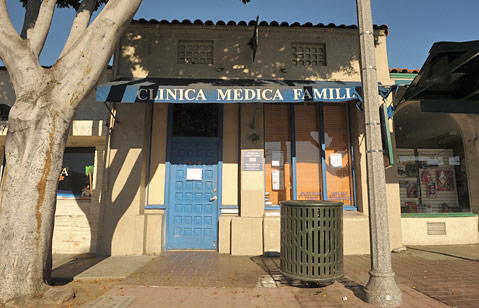Dr. Julio ‘Candyman’ Diaz Faces 200 Years in Prison
Man Accused of Over-Prescribing Pain Pills Under House Arrest in Goleta

Dr. Julio “Candyman” Diaz — a Santa Barbara physician arrested in 2012 on charges of drug trafficking and over-prescribing painkillers to his patients, 11 of whom died of overdoses — may soon strike a plea deal with federal prosecutors to spend up to 200 years in prison and pay at least $10 million in restitution. Under the possible deal — Diaz signed a plea agreement that was filed in late November but must officially consent to it at a January 9 hearing — he would plead guilty to 10 charges of illegally distributing a controlled substance and one charge of illegally distributing a controlled substance to a person under 21 years old.
Diaz would plead guilty to only those charges, and all other counts against him would be dismissed, although they could be considered at his sentencing, the agreement states. The 11 charges stem from Diaz’s treatment of three patients, but prosecutor Ann Luotto Wolf — explaining that Diaz has yet to formally plead — declined to elaborate on details about those patients’ backgrounds or whether any are among the 11 who died. Diaz’s attorney did not respond to requests for comment. Diaz is currently under house arrest in Goleta, Wolf said.
According to the filing, Diaz — whose Family Care Clinic operated at 510 North Milpas — reportedly prescribed one patient more than 1,000 opiates and sedatives in October 2010 and doled out more than 600 to another patient in November and December 2010. The third patient, who was 20 years old at the time, received a prescription for 180 oxycodone pills in September 2009.
DEA agents arrested Diaz, 64, in January 2012. Authorities have said that many of the drugs Diaz prescribed were sold on the street, which often led to overdoses; the 11 deaths occurred between 2006 and 2011. After being arrested, Diaz — who originally pleaded not guilty to all charges — received significant support from former patients. Many said that he was a “strict” doctor who didn’t support drug-addicted patients and that he was being made into a “scapegoat.” The California Medical Board revoked his license in November 2012.
In August, a Santa Barbara Superior Court judge ruled that the pharmacies that filled prescriptions for two of the victims — whose families are suing Diaz — could be held liable for civil penalties. Information on Diaz’s assets was unavailable.
“I’m not prepared to characterize Dr. Diaz as much less bad or much less worse than any other doctor,” said Thom Mrozek, spokesman for the U.S. Attorney’s Office for the Central District of California. “We’ve prosecuted about a dozen doctor cases in the past five years, in which doctors wrote unnecessary prescriptions for dangerous or addictive painkillers,” he went on, explaining that the case will go to trial if Diaz backs out of the deal.



